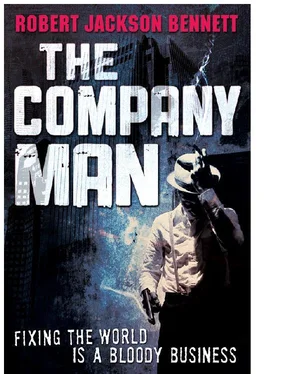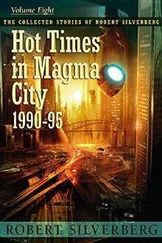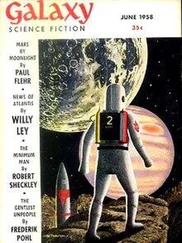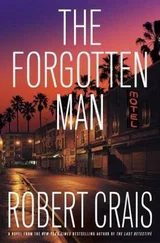Robert Bennett - The Company Man
Здесь есть возможность читать онлайн «Robert Bennett - The Company Man» весь текст электронной книги совершенно бесплатно (целиком полную версию без сокращений). В некоторых случаях можно слушать аудио, скачать через торрент в формате fb2 и присутствует краткое содержание. Жанр: Триллер, на английском языке. Описание произведения, (предисловие) а так же отзывы посетителей доступны на портале библиотеки ЛибКат.
- Название:The Company Man
- Автор:
- Жанр:
- Год:неизвестен
- ISBN:нет данных
- Рейтинг книги:3 / 5. Голосов: 1
-
Избранное:Добавить в избранное
- Отзывы:
-
Ваша оценка:
- 60
- 1
- 2
- 3
- 4
- 5
The Company Man: краткое содержание, описание и аннотация
Предлагаем к чтению аннотацию, описание, краткое содержание или предисловие (зависит от того, что написал сам автор книги «The Company Man»). Если вы не нашли необходимую информацию о книге — напишите в комментариях, мы постараемся отыскать её.
The Company Man — читать онлайн бесплатно полную книгу (весь текст) целиком
Ниже представлен текст книги, разбитый по страницам. Система сохранения места последней прочитанной страницы, позволяет с удобством читать онлайн бесплатно книгу «The Company Man», без необходимости каждый раз заново искать на чём Вы остановились. Поставьте закладку, и сможете в любой момент перейти на страницу, на которой закончили чтение.
Интервал:
Закладка:
“It’s a seasonal thing. They have different shows for winter, summer, spring. The fall one’s my favorite, they do some interesting stuff with leaves. But we missed that.”
“Unless we stick around for a while,” she said.
“Well, there’s that.”
She looked back at him again, and noticed there was something different about him now. He carried the faint smell of violets and lavender about him, and it looked like his hair had been carefully combed. Although she could have been mistaken, she felt sure he’d paid the bathroom attendants to tidy him up as best they could. She was suddenly reminded of a boy headed off to church, frantically trying to arrange himself. She smiled at him and laughed, then clapped one hand over her mouth to stifle it.
“What?” he said, and nervously stroked one side of his hair.
“Nothing,” she said, still fighting a smile. “I simply enjoyed the show, that’s all.” She looked back up at the machinery hidden in the ceiling. “How did they produce the snow?”
“You tell me,” said Garvey. “You work for the people who made it.”
“Ah,” she said. “Aren’t we popular.”
“Something like that,” he said. “Say, you still hungry?”
“Why? Do you know another place?”
He smiled that wide grin of his again. “I know a lot of places.”
This time they went down, descending through a trolley tunnel outside and then taking a hard right away from the lines, toward the middle of Newton. The tunnels themselves seemed almost deserted, as almost all had been since the murders.
“Is this safe?” she asked, but Garvey only shrugged.
As they walked through the tunnels she heard the sound of music and gabbling, and then they emerged into what looked like the heart of an Oriental market of some kind. Little wooden booths and tables were set up against the walls, and paper lanterns hung from the piping overhead. There was hardly any room to move, and considering that the market had to be emptier than usual, like most of the underground, she could hardly imagine it during peak hours.
Since there were so few visitors the vendors and the shopkeepers descended upon them immediately and began hounding them for their custom. She saw that though most booths had an Eastern look about them, more than a few of the vendors were as white as she. Garvey took out his wallet to pay, fumbling with his badge as he did so, and as soon as the light found the glint of his shield the vendors all calmed somewhat, and some disappeared entirely. He sneaked Samantha a sly grin, and then purchased some sweet, crackly honey cakes and strange, spiced meats on wooden skewers, and paper cups of soup with vegetables and fruits of many colors. They drank spiced wine as they walked through the subterranean marketplace, Garvey ducking through the lanterns as they moved, and he showed her many strange goods and services that could only be found here, or possibly at the shore, he said.
She nodded, believing him entirely. She felt suddenly that Garvey knew the city better than any other living soul, and though to her it offered only lonely, scarred alleyways and skies of gray smoke, for Garvey it behaved differently. He could sweep aside all the loneliness and the struggle and find gems and wonders hidden among its many crooks and niches. He knew its subtle joys and eccentricities as one would know an old, wayward friend. And as he showed her each oddity, rich or poor, tasteful or gaudy, she saw in his eyes that he truly loved this place, this anomalous city on the edge of the world, a hodgepodge of towns and technologies and peoples that should not ever be.
They ascended to find the streets had emptied of cars and a light rain was falling. One by one the street lamps flickered on with an angelic hum, filling the streets with pearly light.
“Sometimes I think this city has a voice,” said Garvey as they walked.
“What does it say?” she asked.
Garvey thought for a long while as they walked back to her apartment. He finally said, “That it’s dying.”
“Dying?”
He nodded.
Samantha thought about this. It seemed an impossible notion after he’d shown her so many colorful veins in the city, still alive and thriving. “Dying of what?” she asked.
“Of itself. Under its own weight. And when it’s done, more than Evesden will hurt.”
“How do you mean?”
He kicked at a pebble in the gutter. “You remember what almost happened in Europe?”
“Yes, of course.”
“Yeah. All those bastards out there are just waiting to get at each other’s throats. The only thing that keeps them from doing it is McNaughton, because the second a shot gets fired, they turn off the tap. No more airships, no more telephones. It’d be bad for commerce. I don’t like your company, Miss Fairbanks, but they’ve made a peace, of a very tense and bastardly sort.”
“You can call me Samantha. And I’m aware of the agreement that was laid down after the Crisis.”
“Yeah. I should have figured that. I’m just venting. Samantha,” he added.
“I know. What do you think we can do?” she asked.
He sniffed, thinking. “We just hope we catch this goddamn killer and end this union nonsense in the cleanest way possible, I guess. It wouldn’t be a victory. And I don’t know if it’d be easy to live with. McNaughton would just keep doing what they’re doing. But it’d keep the blood to a minimum. I hope.”
They came to her apartment and the porter tipped his hat to her. She waved back.
“What time is it?” asked Garvey, searching for his watch.
“It’s half past eight.”
“Hum. Well. Thanks for the dinner.”
“But you paid,” she said.
“I can still thank you, can’t I?”
“I suppose. For going to a Newton restaurant?”
“For having an excuse. Yeah.”
She nodded. “Have you ever seen a Newton apartment?”
Garvey stared at her, dumbstruck. Then he quickly recovered and said, “No. Never have.”
“Would you like to?”
He stepped back and looked up the face of the apartment building. “It’s awful tall.”
“It’s a long way up. But it goes by fast.”
They took the elevator up and she led him to her apartment. It did not yet feel like home to her, but it was a warm, dark place, with honey walls and a carpet a deep shade of red. Yet everything was covered in papers, every surface stacked with khaki reports and files, reams of parchment and miles of writing. She felt she should have cared about this, and wanted to clean up, but that urge was strangely absent.
“You take your work home, huh?” Garvey asked.
“I do.”
She walked over to a cupboard, where she pulled out a bottle of port and poured two glasses without asking. He walked to the balcony and looked out at the buildings across, their faces spectral and luminescent in the night.
“You know, some people would have a thing or two to say about a divorced man being unaccompanied in a woman’s apartment,” he said.
“You’re divorced?” she asked.
“Oh,” he said, sheepish. “Yeah. Yeah, I am.”
“I didn’t know that.”
He nodded.
“People would probably have a lot more to say about you being divorced,” she said, bringing him a glass.
“Yeah. They probably would.”
“But this is the twentieth century, and this is the city of the future, isn’t it?” She sat beside where he stood and crossed her legs. As she did her dress rode up, revealing most of her calf, and the tips of her toes brushed the back of Garvey’s knees.
“I guess.” Suddenly he seemed to falter, and he looked at the glass in his hands, then up at her. “Think this is a good idea?”
“What is?” she asked.
He didn’t say anything. Just stood there handling the little glass of wine.
Читать дальшеИнтервал:
Закладка:
Похожие книги на «The Company Man»
Представляем Вашему вниманию похожие книги на «The Company Man» списком для выбора. Мы отобрали схожую по названию и смыслу литературу в надежде предоставить читателям больше вариантов отыскать новые, интересные, ещё непрочитанные произведения.
Обсуждение, отзывы о книге «The Company Man» и просто собственные мнения читателей. Оставьте ваши комментарии, напишите, что Вы думаете о произведении, его смысле или главных героях. Укажите что конкретно понравилось, а что нет, и почему Вы так считаете.












